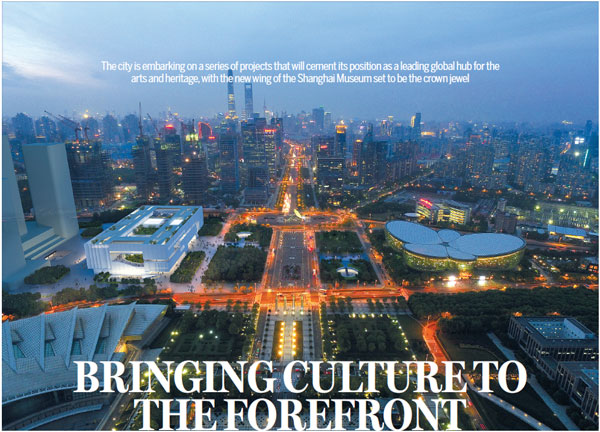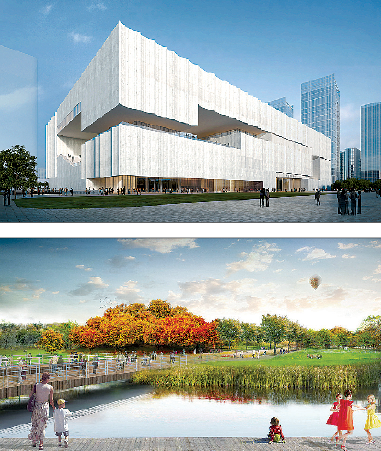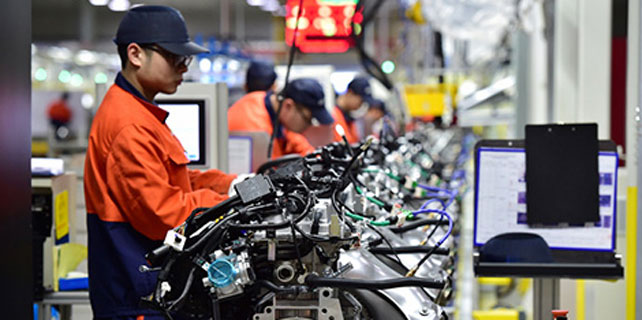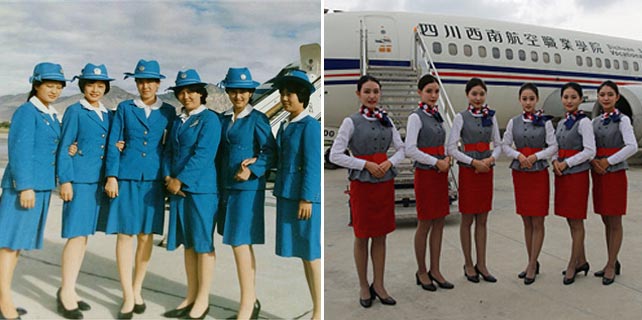Bringing culture to the forefront
The construction of the new branch of the Shanghai Museum in Pudong New Area is among a slew of new projects in the city aimed at turning Shanghai into an international cultural hub by 2020.
These projects are part of a masterplan to turn Shanghai into a world-class metropolis in a variety of areas, including science, innovation, shipping and trade.
The new wing is considered one of the most significant projects of the plan as the Shanghai Museum is widely considered the most reputable in the city and attracts the most public attention.
Located next to the Shanghai Science and Technology Museum, the new Shanghai Museum East Wing will be built alongside the new Pudong branch of the Shanghai Library. The construction of the two facilities kicked off on Sept 27.
When the two buildings are completed by 2020, the area between Century Avenue, Yanggao Road South and Dingxiang Road, will become the new heart of Pudong's cultural scene.
The new Shanghai Museum East Wing will occupy 105,000 square meters, about twice the size of its existing venue at People's Square, and have six floors and two basement levels. The building, which is designed by architect Li Li and his team from the architectural institute of Tongji University, will be minimalistic in nature and have a marble facade.
Visitors to the new museum will also be able to view the Lujiazui cityscape from the cafe lounges, outdoor patios and roof gardens in the facility.
According to Yang Zhigang, director of the Shanghai Museum, the new wing will focus on further developing the museum's educational function. To achieve this, an interactive space has been created to showcase exhibits about human civilization.
The museum will also have a reading room, digital video room and lecture hall.
The Shanghai Museum currently receives about 2 million visitors every year, with most of them being overseas travelers. Students and young audiences only account for a small percentage of the crowds and Yang hopes the new wing will be able to draw more of such individuals.
Yang added that the museum is striving to become one of the world's top venues featuring ancient Chinese art and will rely on technology to achieve this goal. For example, the new wing will feature a state-of-the-art exhibition space reserved for showcasing ancient Chinese culture and special rooms where the temperature and air quality are controlled will be built to store fragile and precious objects that were not previously shown to the public. There will be a strong focus on designing new exhibitions that can tell compelling stories.
Li Zhongmou, deputy director of the Shanghai Museum, said that the main branch of the museum in People's Square is undergoing renovation works, with much of it involving the changing of old plumbing systems and wires.
This is the first time such a large-scale renovation project is taking place in the museum since the building was first put into use in 1996.
Other ongoing cultural projects in Pudong include the Pudong Art Museum and the Expo Culture Park.
Situated near Lujiazui, the Pudong Art Museum sits on a prime piece of land by the Huangpu River that has been coveted by real estate developers. However, in a bid to show that it is serious about becoming a global cultural hub, city authorities have set aside this area for the development of arts and culture.
When completed, the Expo Culture Park will occupy 188 hectares and be joined with the existing 23-hectare Houtan Park. According to officials, the city will invest more than 10 billion yuan ($1.6 billion) in the building of the Expo Culture Park, which members of the public have dubbed as Shanghai's very own Central Park, a reference to the famous park in New York City in the United States.
The design of the new park, which will have a diverse botanical composition, will reflect Shanghai's industrial history by featuring a landscape created using junk materials from the construction industry. The space will house a new opera house and be able to host outdoor concerts.
Shanghai presently has 77 art museums that host about 500 exhibitions every year, four times more than five years ago, according to Eastday.com. Eighty percent of the 125 State-owned or specialized museums - they receive more than 21 million people in total every year - are free to the public.
zhangkun@chinadaily.com.cn

 |
|
An aerial view of the various artistic venues in Pudong New Area (top). An artist's impression of the new wing of the Shanghai Museum in Pudong (middle) and an illustration of what the Expo Culture Park will look like when it opens (bottom). Photos provided to China Daily |




















